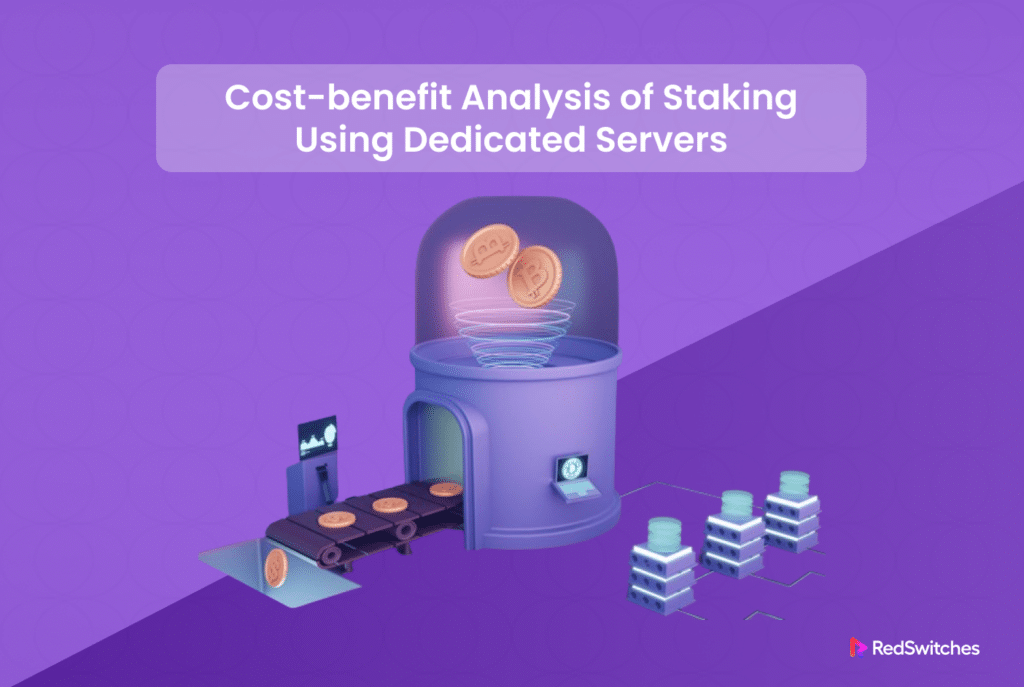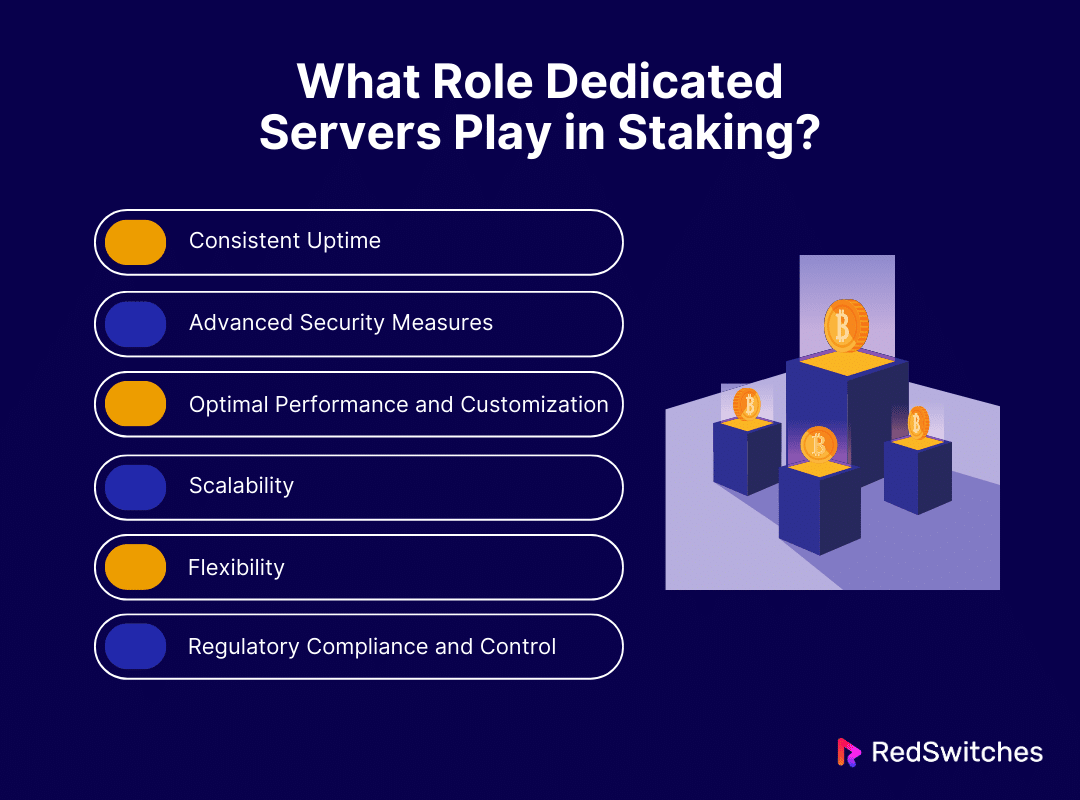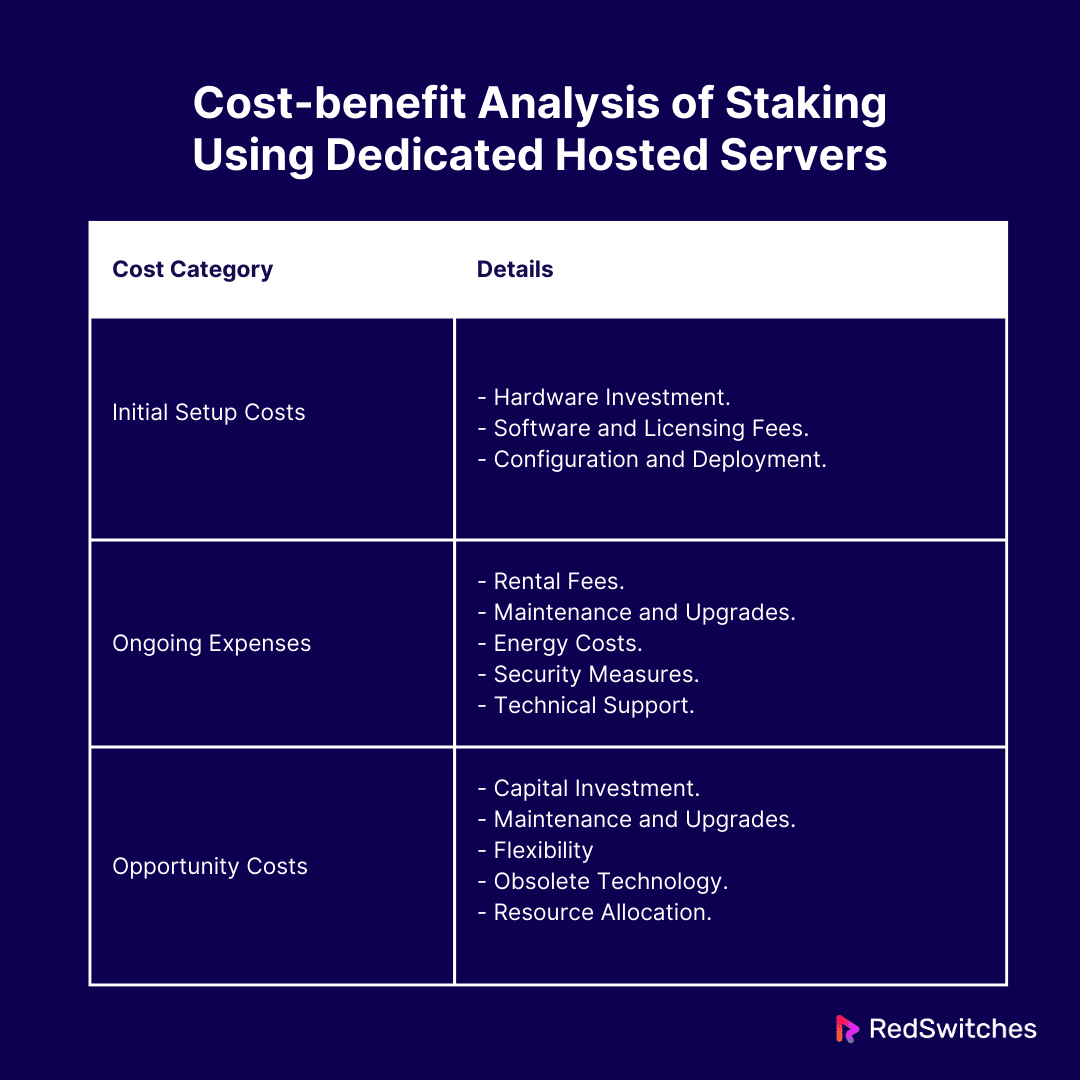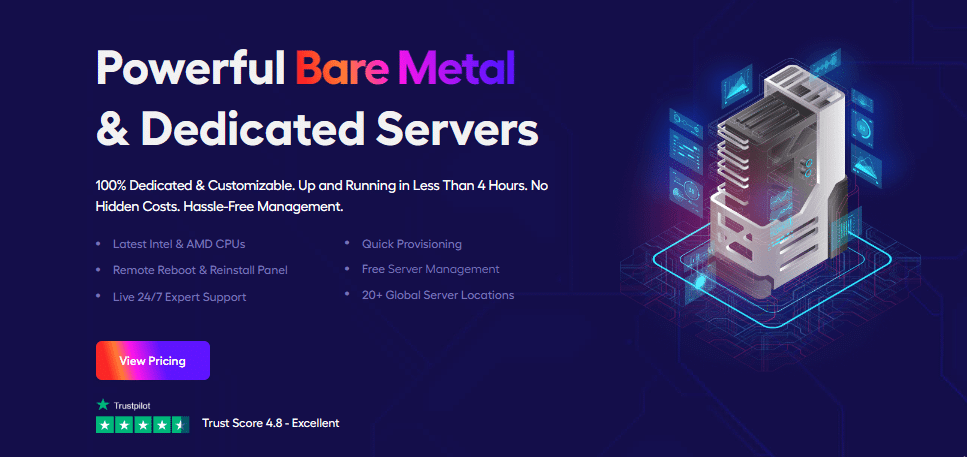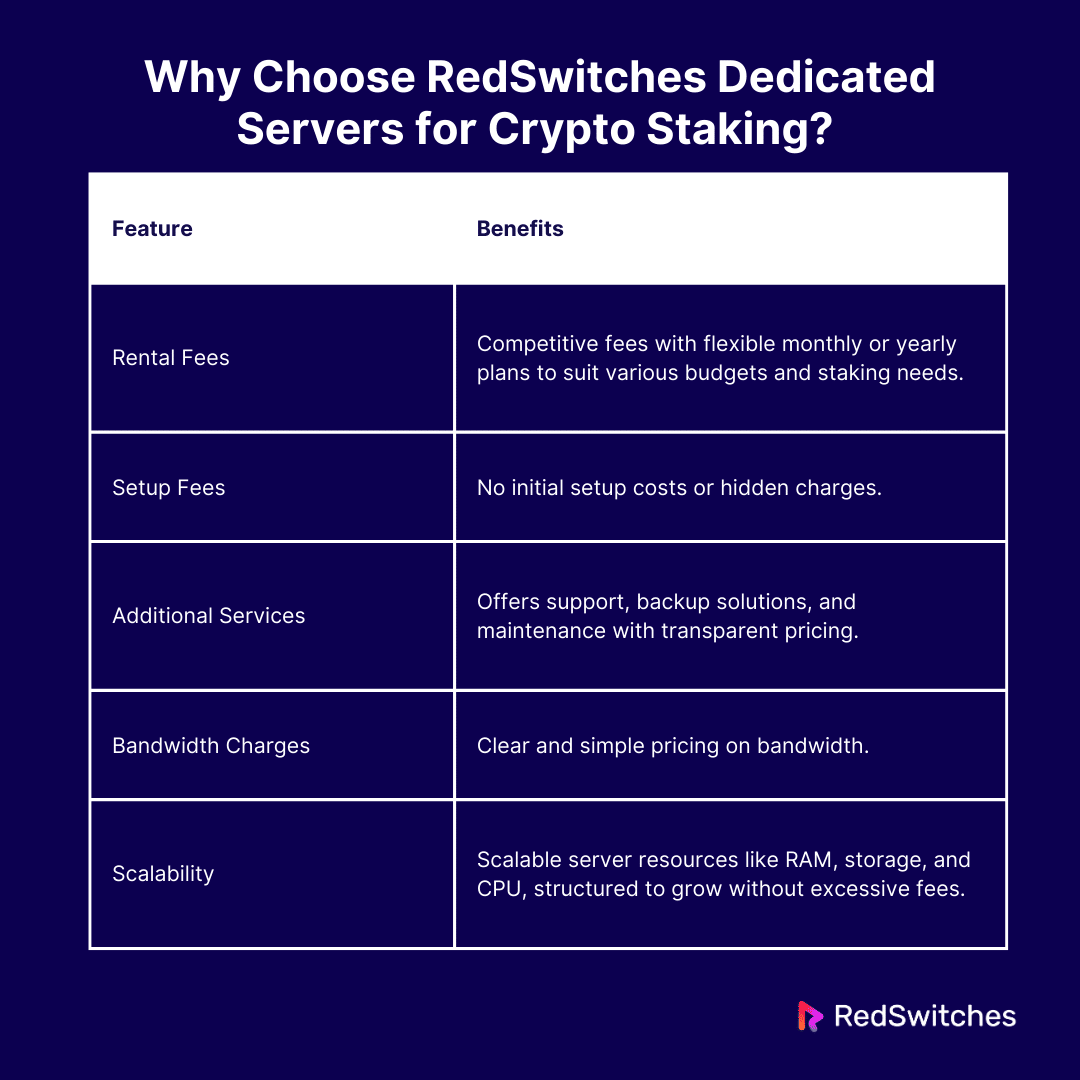Key Takeaways
- Staking is the process of holding digital currency in a digital wallet to supplement the functions of a blockchain network.
- Staking benefits using dedicated servers include constant uptime, optimal performance, and scalability.
- The setup costs of using dedicated hosted servers for staking are hardware/software, licensing, etc.
- The ongoing expenses of using dedicated hosted servers for staking are maintenance, rental fees, energy costs, etc.
- The cost-benefit analysis of staking using dedicated servers shows they are worthwhile investments.
- Choosing RedSwitches for staking offers many financial benefits. These include a zero initial setup fee, affordable scalability, and transparent pricing.
Did you know there were around 575 million identity-verified crypto asset users in 2024? This value may be much higher considering the number of crypto asset users that may not be identity verified. In 2024, this value is expected to grow even more. With the growing popularity of crypto assets, the crypto staking market has also experienced increasing growth.
As more individuals dive into this arena, there are growing queries about the cost-benefit analysis of using dedicated hosted servers for crypto staking. To address these answers, we have conducted an in-depth cost-benefit analysis below. This analysis provides an in-depth glimpse into the staking benefit using dedicated servers.
Let’s dive in!
Table of Contents
- Key Takeaways
- Understanding Crypto Staking
- What Role Dedicated Servers Play in Staking?
- Cost-benefit Analysis of Staking Using Dedicated Hosted Servers
- Final Verdict: Is it Worth it?
- Why Choose RedSwitches Dedicated Servers for Crypto Staking?
- Conclusion-Staking Benefit Using Dedicated Servers
- FAQs
Understanding Crypto Staking
Credits: FreePik
Before we discuss the cost-benefit analysis and staking benefit using dedicated servers, let’s go over what staking is.
Staking is the process of holding cryptocurrencies in a digital wallet to support the functions of a blockchain network. It is a great way to earn incentives and is ideal for those looking for passive income streams.
Participants who stake their currencies are chosen regularly to generate blocks. They also validate transactions or perform other network functions in exchange for incentives. The more coins you stake, the better your chance of getting picked as a validator.
Staking is a key component of (PoS) proof-of-stake systems. POS is an alternative to the energy-intensive (PoW) proof-of-work systems used by networks. Proof-of-stake offers a less resource-heavy way of maintaining network integrity and security, making it suitable for environment advocates and network participants.
Are you wondering how dedicated hosted servers and crypto staking are connected? Read our blog, ‘The Connection: Dedicated Servers In Crypto Staking.’
What Role Dedicated Servers Play in Staking?
So, why use dedicated servers for staking? What role do these servers play in staking crypto? These are some common questions individuals may have when contemplating the cost-benefit analysis of dedicated hosted servers for staking and whether it is worth switching to them. Let’s take a look at a few factors explaining the role dedicated hosted servers play in terms of staking:
Consistent Uptime
Uninterrupted network connectivity is the top benefit of using dedicated hosted servers for staking. Blockchains demand a constant and stable connection to the internet. They must conduct transactions and sustain the ledger in real time.
These servers offer a reliable infrastructure that assures your staking processes are online. This constant uptime is important. Any disconnection can cause missed opportunities to earn incentives. In worst cases they may also result in penalties for going offline.
Advanced Security Measures
Did you know worldwide cybercrime costs will likely reach $10.5 trillion yearly by 2025? Security is a necessity, especially in the cryptocurrency space. Dedicated hosted servers have a lot to offer on the security front. They provide users with complete access to the server resources, and they don’t have to worry about sharing them with others.
This setup minimizes the risk of cyber-attacks and unauthorized access. Administrators of dedicated servers can implement robust security measures such as:
- Advanced firewalls.
- Intrusion detection systems.
- Physical security practices (on-site guards and surveillance).
This means stakers digital assets are secure against physical and cyber threats, an important factor when large amounts of digital currency are at stake.
Optimal Performance and Customization
Staking on a dedicated hosted server offers more control over the software and hardware environment. Users can tailor their setups according to the blockchain protocols they support and their needs. They can choose processors with:
- Optimal speed.
- Opt for increased RAM for handling transactions.
- Have access to large enough storage to adapt to growing blockchain sizes.
Customization is also available at the software level. Stakers can configure operating systems and staking software to ensure efficient transaction processing. This is especially important in networks where the speed of validating transactions can influence reward mechanisms.
Scalability
Credits: FreePik
The need for exceptional server capabilities like scalability is more important than ever as the stakes (literally) get higher in staking operations. Dedicated hosted servers deliver the scalability that staking requires.
These servers can smoothly adapt to this growth by increasing processing power or scaling storage. This scalability ensures that staking operations can increase or contract resource allocations depending on current needs and future growth predictions without performance issues or downtime.
Flexibility
Dedicated hosted servers are praised for being flexible. Operators can:
- Upgrade system configurations.
- Install the necessary software.
- Adjust settings to optimize performance.
This level of control is crucial for maintaining efficiency in staking processes. This is especially true when participating in several staking pools.
As staking algorithms become more advanced, having a server that can adapt quickly to new requirements is invaluable.
Regulatory Compliance and Control
The rules and regulations around digital currency are strict. This makes it important for those who operate in or cater to users from highly regulated jurisdictions to ensure compliance. Dedicated hosted servers offer a robust framework for attaining and sustaining compliance with various international and local regulations.
Having a dedicated hosted server means you can have precise control over where your data is held. This is important for compliance with laws like GDPR, which demand data to be stored in certain locations.
These servers also allow for improved data management and security protocols. They are important for fulfilling audit requirements and ensuring all operations meet legal standards.
Cost-benefit Analysis of Staking Using Dedicated Hosted Servers
When contemplating investing in dedicated servers for crypto staking, beginners may conduct a cost-benefit analysis to see whether investing in these servers is worthwhile.
Conducting a thorough and accurate analysis can be time-consuming. It may demand extensive research and expert assistance. Although the cost-benefit analysis results may vary from individual user to user, we have conducted a general cost-benefit analysis that applies to all users.
What Costs to Expect When You Stake Crypto Using Dedicated Hosted Servers?
Credits: FreePik
Initial Setup Costs
The initial setup costs involved in staking using dedicated hosted servers include:
Hardware Investment
The biggest expense of starting staking operations with dedicated hosted servers is hardware. Staking requires the use of powerful servers that can handle continuous operations and the needs of blockchain transactions.
To efficiently satisfy these demands, specifications like high CPU performance, enough RAM, and dependable storage solutions are required. These characteristics have a direct impact on pricing. More powerful servers will require more leasing costs.
However, using dedicated hosted servers through a provider might result in considerable savings. These providers absorb the capital expenses of procuring and maintaining such high-quality hardware. This arrangement reduces the barrier to entry by lowering initial expenses. It also assures that the hardware is kept up to date without you incurring extensive costs.
Software and Licensing Fees
The chosen blockchain technology and the individual staking protocols determine the software requirements. Many blockchain applications rely on open-source software that does not require licensing fees, which may greatly decrease startup expenses.
However, it is advisable to examine any specialist software or staking applications that may need a costly license. Fortunately, the extensive use of free solutions in blockchain setups results in low software expenses, making it a less important financial worry during the setup phase.
Configuration and Deployment
Deploying dedicated hosted servers for staking requires careful setup. This helps improve security and operational efficiency while ensuring compliance with blockchain rules. The complexity of this setup varies according to the blockchain’s needs and the server’s architecture. Providers such as RedSwitches offer an appealing setup proposition. They remove the expenses generally linked with these early installations.
This service comprises:
- The server’s physical setup.
- Software installation.
- Network setups.
These are critical for a safe and effective staking operation. The lack of setup fees eliminates a significant cost component, making it easier for new participants to start staking and decreasing the overall financial burden.
Also Read: Ultimate Guide To Node Staking On Dedicated Servers.
Ongoing Expenses
The ongoing expenses involved in staking using dedicated hosted servers include:
Rental Fees
The rental costs for dedicated hosted servers are the primary ongoing expenses in a staking business. These costs vary depending on the server’s specifications and the bandwidth needs. They are crucial for maintaining a stable connection to the blockchain network.
Choosing a hosting package that ideally combines cost and performance is critical to ensure the staking process operates smoothly without overpaying. Providers frequently provide tiered pricing structures to meet varying demands. This makes it easy to scale up or down based on your staking performance and market trends.
Maintenance and Upgrades
Regular maintenance ensures that the dedicated hosted servers function correctly and remain safe. This includes software upgrades, security patches, and hardware inspections. While people who manage their own servers may incur large fees for such services, a hosted option considerably decreases these expenses.
The provider usually administers these activities, distributing the cost across their customer base. This can result in significant savings compared to directly managing an individual server.
Due to their size and links with hardware vendors, the provider can frequently implement these at a reduced cost when improvements are necessary, such as more storage or processing capacity.
Energy Costs
Credits: FreePik
Energy consumption is a notable consideration when running dedicated hosted servers. This is especially important since energy is necessary to power the equipment for continuous staking. When maintaining servers in-house, energy expenses might vary based on local energy prices and use rates. These are usually unexpected since energy prices tend to fluctuate.
Dedicated hosted servers include these expenses in the rental rates. They stabilize monthly expenses and free the customer of the responsibility of energy management.
Security Measures
Security upgrades are an important ongoing expense in staking with dedicated hosted servers due to the direct financial risks involved in the event of a security breach. Dedicated hosted server providers usually integrate exhaustive security protocols in their services.
Using economies of scale, these companies may provide greater security measures at a cheaper cost per customer than if clients implemented similar systems on their own servers.
Technical Support
Access to trusted technical help is critical while running dedicated hosted servers for staking. This support helps immediately tackle technical issues, like hardware breakdowns, to lower losses. Most providers provide basic assistance in their normal service packages. They also offer the opportunity to purchase additional support services.
This access to experienced support maintains the continuity and stability of staking operations. It offers peace of mind while minimizing the need for expensive in-house technical manpower.
Opportunity Costs
Many overlook the opportunity costs when conducting a cost-benefit analysis for dedicated hosted servers for staking. This can lead to an inaccurate cost-benefit analysis and surprises later on. This is why adding the opportunity costs when conducting this analysis is important.
Also Read: Cloud Server Vs Dedicated Hosted Server For Staking.
For those who don’t know, the opportunity cost refers to the potential benefits one may miss out on when picking one alternative over another. Here are some key opportunity costs linked with using dedicated hosted servers for staking:
1. Capital Investment
The upfront and ongoing expenditures of running a dedicated hosted server might be high. This involves the purchase of hardware, software licensing, and security measures. The funds spent on these servers might be used for other investments that provide faster or better returns.
2. Maintenance and Upgrades
Maintaining a dedicated hosted server takes time and funds. The server’s operational and security maintenance require:
- Regular updates.
- Security checks.
- Hardware upgrades.
This continual commitment diverts resources away from other possible areas for development or investment in your business.
3. Flexibility
Dedicated hosted servers give increased control and customization but lack the flexibility and scalability that cloud-based systems provide. The capacity to grow quickly and affordably is critical in current times, where technology keeps evolving. Physical infrastructure investment may limit your ability to react quickly to new possibilities.
4. Obsolete Technology
The technology sector changes frequently. This is why dedicated hardware might quickly become obsolete. The cost of a dedicated hosted server hardware that has gone obsolete indicates a missed chance to invest in newer, more efficient technologies that provide greater performance or reduce long-term expenses.
5. Resource Allocation
You must have expertise or skilled personnel to efficiently manage a dedicated hosted server. The resources used to manage and operate these servers might be reallocated to other key areas such as research and development, marketing, or customer service, thus offering more advantages to the company.
Considering these potential costs is vital when investing in a dedicated hosted server for staking. It is essential to weigh the immediate expenses and rewards and what may be lost by pursuing this choice.
Also Read: Infrastructure Requirements For Crypto Staking In 2024.
Benefits
Besides offering security, flexibility, and high performance, dedicated hosted servers offer many other benefits. Here are some other staking benefit using dedicated servers:
Professional Support
Credits: Unsplash
One main benefit of staking using dedicated server is access to expert assistance. This assistance is helpful, especially in the complex and continuously changing field of staking.
Professional support teams are prepared to quickly address hardware breakdowns, software patches, and other vital issues, resulting in minimal downtime. This lets you focus on staking techniques to earn more incentives instead of worrying about server maintenance or repairs.
Network Stability
Consistent network connectivity is vital for staking activities. Dedicated hosted servers often feature premium bandwidth and modern network infrastructure. This results in excellent throughput and minimal packet loss.
This reliability in network connectivity eliminates disruptions in staking procedures. Consistent network connections are crucial for verifying transactions on the blockchain. A reliable network means all transactions are completed without delay. It ensures the integrity and continuation of your staking contributions.
Long-Term Cost Efficiency
The initial costs of installing a dedicated hosted server may be slightly higher, especially compared to shared hosting costs. However, these servers may offer impressive long-term cost efficiency. Dedicated hosting might result in higher staking returns while reducing losses due to technical breakdowns or security breaches.
The flexibility to expand resources according to your needs allows for effective budgeting. You also don’t have to worry about overpaying for underutilized capacity. This helps maximize your return on investment over time.
Isolation from Server Neighbors
Staking on dedicated hosted servers gives a notable benefit in terms of resource isolation. A dedicated hosted server guarantees that all resources are only committed to your staking activity. This exclusivity is critical to the performance and security of your operations.
A dedicated hosted server provides separation from other users and protects your staking activities from the “noisy neighbor” effect. In shared environments, if a user demands extensive resources, others on the same server may face reduced performance. This might appear as slower processing times or even momentary downtimes. This is undesirable when it comes to performing timely validations of blockchain transactions.
Reduced Latency
The geographical location of your dedicated hosted server can minimize latency. This is especially true if you choose a data center near the blockchain nodes you often connect to. Lower latency improves the timeliness of your staking activities. This is essential for successfully engaging in real-time transaction validations.
This geographical flexibility increases transaction processing speeds and allows you to stake effectively.
Also Read: Integrating Server Costs Into Crypto Staking Calculator.
Also Read: What Is the Minimum Lockup Period for Crypto Staking?
Final Verdict: Is it Worth it?
Credits: Unsplash
According to a cost-benefit analysis, dedicated hosted servers are a worthwhile investment. They offer reliable, secure, scalable computing resources and many benefits, including hardware, energy, and maintenance cost savings. The enhanced security and technical support that comes with them is the cherry on top.
These staking benefits using dedicated servers make server integration an appealing option for optimizing operational efficiency and performance without the capital expenditures linked with managing physical servers on-site. While these servers may initially come with higher investment needs, they offer many long-term financial benefits. Besides, choosing a provider that offers competitive pricing, customizability, and transparent pricing can help you lower the costs initially and in the long run.
Why Choose RedSwitches Dedicated Servers for Crypto Staking?
Credits: RedSwitches
When seeking options for staking via dedicated hosted servers, RedSwitches is a convincing choice. It offers a transparent pricing structure and many other benefits. Here are some important financial considerations that make RedSwitches a good option for this purpose:
Rental Fees
For those who wish to rent their servers, RedSwitches delivers competitive fees for its dedicated hosted servers. Whether you want to commit yearly or test out the servers every month, their pricing is structured to cater to various budget needs and staking requirements. This flexibility lets users choose a plan that fits their operational and financial goals best.
Setup Fees
One key feature of picking RedSwitches is the lack of initial setup expenses. Many hosting providers charge added costs for setting up your servers. RedSwitches operates slightly differently. They eliminate this concern, making the entry into staking more cost-effective and accessible.
They also guarantee no hidden charges. The price you see or discuss with agents is the price you will pay. This offers peace of mind and helps in budget planning and financial forecasting.
Also Read: Optimize Crypto Returns: Top 7 Crypto Staking Calculators.
Additional Services
Although the server’s base prices are competitive, RedSwitches provides more services to boost your staking operations. These services include:
- Support
- Backup solutions
- Maintenance
These are important for data integrity and overall server health. The costs for these services are transparent. Potential clients are advised to discuss their needs with the RedSwitches customer service agents to customize a package that matches their requirements.
Bandwidth Charges
The fees linked with network usage and data transfer are important aspects to consider when staking. RedSwitches offers simple and clear pricing on bandwidth. Users only spend funds on what they need, which can help lower operating costs. This is an excellent benefit for those who prefer closely managing their bandwidth requirements.
Scalability
Scaling your server resources, including RAM, storage, and CPU, becomes necessary as your business grows. RedSwitches offers scalable solutions enabling you to conveniently upgrade your server resources. This scalability is highly cost-effective. It is structured to grow with your needs without imposing excessive fees.
RedSwitches servers present a scalable and financially sensible solution for anyone wishing to begin staking. Their lack of hidden costs, pricing transparency, and added services make them a compelling choice for businesses and individuals looking for dependable and effective staking infrastructure.
Conclusion – Staking Benefit Using Dedicated Servers
The cost-benefit analysis of using dedicated hosted servers for crypto staking confirms their value. These servers maximize returns and lower costs while cutting initial hardware expenses. They also offer ongoing savings in maintenance, energy, and security management.
RedSwitches provides a range of dedicated hosted server solutions tailored for staking operations. Choosing RedSwitches allows stakers to enjoy competitive pricing, robust security, and scalable resources.
Whether starting or growing your staking activities, RedSwitches offers the essential high-quality infrastructure. Contact us today (+65968386) for more information on staking benefits using dedicated servers. You can also visit our website to explore our server options for blockchain applications.
FAQs
Q. What is the benefit of a dedicated server?
The top benefit of dedicated hosted servers is that they allow exclusive resource use. Other benefits include better performance, improved security, and increased resource control. These servers also enable customization depending on needs and ensure high uptime.
Q. What is the benefit of staking?
Staking provides countless benefits. It allows digital currency holders to earn rewards on their holdings, offering a steady income stream. It also helps secure the network and, depending on the protocol, can give stakers a say in governance decisions.
Q. How does staking help the network?
Staking increases the network’s security by incentivizing participants to operate honestly and support network operations. It also helps validate transactions and create new blocks, supporting the general stability of the blockchain.
Q. What is staking in the world of cryptocurrency?
Staking is the process of validating transactions on a blockchain network by locking up a certain amount of cryptocurrency as collateral.
Q. How does staking differ from other consensus mechanisms like Proof of Work (PoW)?
Proof of Stake (PoS) is a consensus mechanism that relies on network participants holding and staking their token to validate transactions. In contrast, Proof of Work involves miners solving complex mathematical puzzles.
Q. What are the advantages of staking?
Some advantages of staking include earning staking rewards contributing to the security and decentralization of the network, and promoting network scalability.
Q. How can I start staking my crypto assets?
To begin staking, you usually need to choose a staking pool or set up your own staking node. You can do this using a virtual private server or a dedicated hosted server and stake your tokens accordingly.
Q. What is the staking process involved in validating transactions?
Staking involves locking up a certain amount of cryptocurrency in a wallet to participate in the network’s consensus mechanism and validate transactions in return for earning rewards.
Q. How can I maximize my staking rewards?
To optimize your staking rewards, you can ensure you meet the staking requirements, carefully choose your platform, and explore the available staking offers.
Q. What are the different types of staking available in the crypto market?
Different staking methods are available in the crypt market. Popular ones include pooled staking, liquid staking, and delegated staking.
Q. What is crypto staking?
Crypto staking involves actively participating in the blockchain network by staking or locking a certain amount of tokens to support the network and validate transactions. It is usually associated with proof-of-stake (PoS) networks, where validators are chosen based on the number of tokens they stake.
Q. How can I stake tokens on a staking platform?
To stake tokens in a staking platform, you typically need to connect your crypto wallet to the platform, pick the staking offer that fits your requirements, and then delegate your tokens for staking. The platform will use your staked tokens to participate in staking activities and generate staking rewards.
Q. What are the benefits of staking crypto?
Staking crypto offers several advantages, including rewards for supporting the network and contributing to network security. It also offers the chance to gain voting rights in governance decisions. You can help secure the network and earn passive income by participating in staking.
Q. Can I stake my crypto assets on a dedicated hosted server?
Crypto assets can be staked on a dedicated hosted server that meets the blockchain network’s staking requirements. Before choosing a staking server, ensure it provides the required support and infrastructure to maximize your staking rewards.
Q. What are the different types of staking available in the POS network?
In a Proof of Stake (PoS) network, the main types of staking include delegated staking, where users delegate their coins to a staking pool run by others. Another type is solo staking, where users operate their own validator node. Liquid staking solutions also allow participants to stake their assets while retaining liquidity through derivative tokens representing the staked coins.
